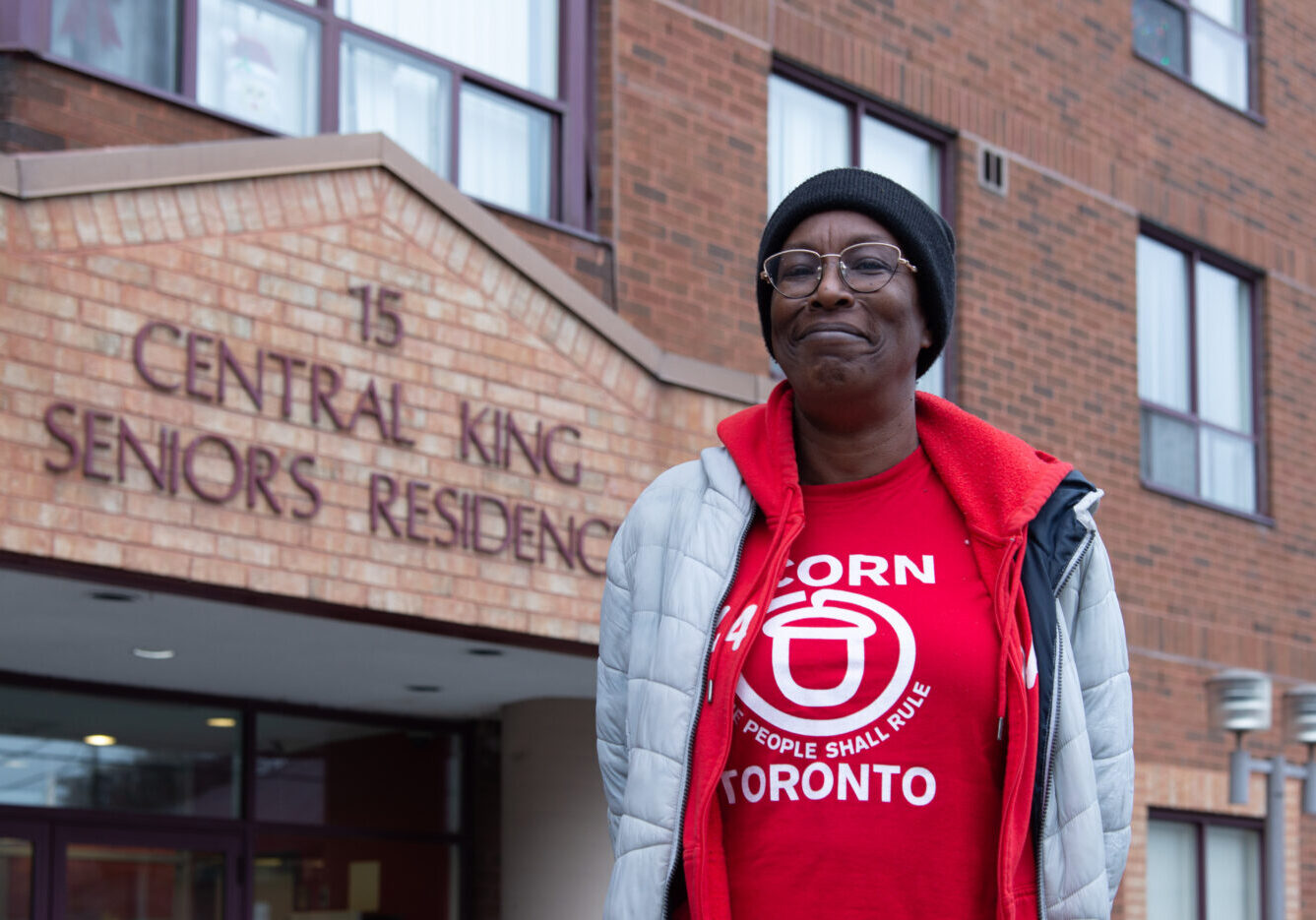Why Toronto is in a housing ‘state of emergency’ — and who’s affected most
THE GREEN LINE
ACTION JOURNEY STORY
Why Toronto is in a housing 'state of emergency' — and who's affected most
Immigrants and people with disabilities are the most likely to live in unaffordable housing situations, according to analysts.

Marcia Stone, co-chair of the Weston chapter of the Association of Community Organizations for Reform Now (ACORN), says Toronto has moved past a 'housing crisis' and into a 'state of emergency.'


ALOYSIUS WONG
Toronto Metropolitan University Master of Journalism graduate. Lives in North York where he prays that the Eglinton Crosstown will eventually be completed.
March 11, 2024
This story is part of The Green Line's Action Journey on Toronto's housing crisis. Our seven-part story series examines the impossible climb towards home ownership, precarious rental situations and the pipeline from unaffordability to living on the streets.
Sign up for our storytelling event and Story Circle on March 19, 2024, where attendees will share their experiences with the city's housing market and brainstorm community-led solutions to navigate housing in Toronto. Dinner and refreshments will be provided.
While paying rent is difficult for many Torontonians, it’s just about impossible for the city’s most vulnerable.
Using 2022 figures, the City of Toronto calculated the cost of living for people in different living and income scenarios. They found that without subsidized housing, the average monthly rent for a bachelor or one-bedroom apartment in Toronto would exceed the income of a person relying on Ontario Works or the Ontario Disability Support Program, requiring them to dedicate all of their income towards rent. This leaves them short hundreds of dollars to afford food, transportation and other expenses.
The issue of affordable housing becomes even more dire when considering market rents for new tenants in Toronto. In the same analysis, the City likewise found that a minimum-wage earner renting a bachelor apartment at market rent ($2,028 as of March 2024, according to Rentals.ca) would barely scrape by — let alone be able to support children or other dependents.
“A lot of people nowadays are having to do that, unfortunately,” says Marcia Stone, co-chair of the Weston chapter of the Association of Community Organizations for Reform Now (ACORN).
Newer tenants are especially liable to have to pay additional fees on top of a much higher market rent. This chasm in costs for old versus new tenants is particularly pronounced in rent-controlled buildings like 399 Markham Rd. in Scarborough, where Janak Ramcharran currently lives in a two-bedroom apartment. Her current rent is $1,422, heat and hydro included, a gradual increase from the $880 she paid when she first moved there in June 2004. A new tenant moving into a similar two-bedroom unit would now have to pay at least $2,100 a month, plus the costs of electricity and hot water.
The need for affordable housing is particularly pronounced in Toronto, compared to other Canadian cities. In 2021, Statistics Canada reported we had the highest rate of unaffordable housing in the country among census metropolitan areas at over 30 per cent.
ACORN’s Stone says the behaviour of corporate landlords is particularly egregious, and she consistently hears about their lack of care from tenants at chapter meetings across Toronto.
“They treat the tenants as an ATM machine,” she says. “Literally, that's what we are: a commodity.”
“We're no longer in a crisis — a housing crisis. We're in a state of emergency and it should be treated as such.”

Political economist Ricardo Tranjan says the term 'housing crisis' obscures the fact that tenants' and landlords' interests are fundamentally misaligned.

CENTURY-LONG
‘HOUSING CRISIS’
Expert analysis backs up Stone’s perspective.
Ricardo Tranjan, a political economist and senior researcher with the Canadian Centre for Policy Alternatives (CCPA), likewise contends that the so-called housing crisis in Canada has persisted for over a century.
“When you look at the rental housing market, it has been structured the same exact way for a very long time. It is tenants and unhoused folks who are actually experiencing the negative impacts of what we see right now,” says Tranjan, author of the 2023 book The Tenant Class.
He argues that describing the situation as a crisis obscures the fact that tenants’ and landlords’ interests are fundamentally misaligned. Trajan says the rental housing market has been structured to benefit real estate investors at the expense of tenants and unhoused people for “a very long time,” so not everyone is equally motivated to “solve” the crisis.
“It is misleading to characterize this as a crisis,” he explains. “It is a rental housing market that doesn't work for everyone. It allows [landlords] to get really wealthy, but at the cost of others’ experience and housing security.”
Tranjan prefers to refer to it as “a rental housing market that allows for the exploitation of tenants” to better reflect who’s actually affected by the crisis.
He adds that major cities like Toronto are the first to experience the impact of housing policies — or “negligence” — before mid-sized cities like Ottawa or smaller towns like Peterborough.
This reality is driving many to move away from the city. According to a Desjardins analysis, many young adults are leaving Toronto for more affordable cities, such as Windsor and London, Ont. What’s more, Desjardins reports that young adults who are immigrants or visible minorities were more likely to struggle with housing affordability, spending over 30 per cent of their income on shelter.
Because of Toronto’s identity as the city that welcomes many of Canada’s newcomers, Tranjan says the issue is an especially intersectional one here. “Whatever is happening in terms of inequality and any dynamic that touches segregation or discrimination — in Toronto, it will be more clearly touched [upon].”
Tranjan also co-authored a July 2023 report for the CCPA, which found that two minimum-wage earners in Toronto wouldn’t be able to afford market rent for a two-bedroom apartment in the city at 30 per cent of their income.
“You’re putting people in a very hard situation,” he says. “You’re forcing them to sacrifice other basic needs. Or you’re just putting them at the very direct risk of becoming unhoused and suffering all the consequences that could come with that.”
Next in The Green Line Housing Crisis Action Journey Story Series: Homeless shelters in Toronto are pushed to their limit. Social housing can't close the gap.
Fact-Check Yourself
Sources and
further reading
Don't take our word for it —
check our sources for yourself.
